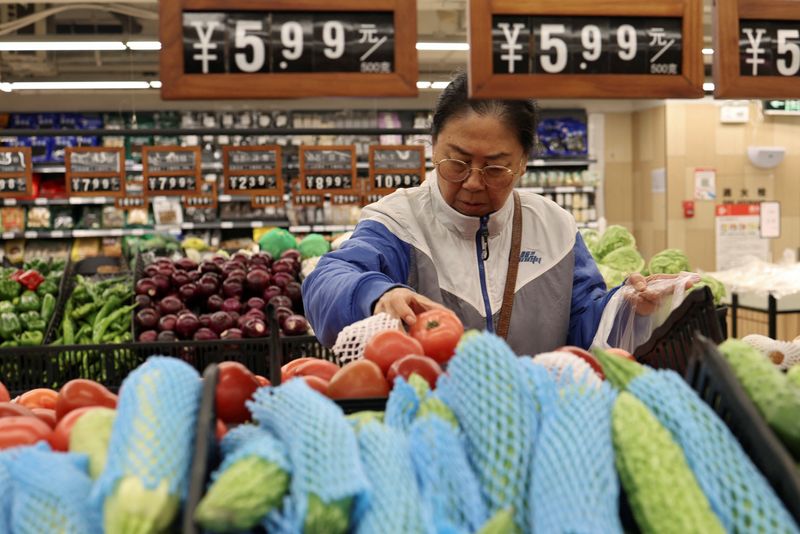By Kevin Yao
BEIJING (Reuters) - China's economy grew at the slowest pace since early 2023 in the third quarter, and though consumption and factory output figures beat forecasts last month a tumbling property sector remains a major challenge for Beijing as it races to revitalise growth.
Authorities have sharply ramped up policy stimulus since late September, but markets are waiting for more details on the size of the package and a clearer road map to put the economy back on a solid longer-term footing.
The world's second-largest economy grew 4.6% in July-September, official data showed, a touch above a 4.5% forecast in a Reuters poll but below the 4.7% pace in the second quarter.
"China's Q3 2024 data is not a turn-up for the books," said Bruce Pang, Chief Economist at JLL. "The performance aligns with market expectations, given the weak domestic demand, a still struggling housing market, and slowing export growth."
"The stimulus package announced at the end of September will take time and patience to boost growth over the next several quarters," he added.
Officials addressing a post-data press conference on Friday expressed confidence the economy can achieve the government's full year growth target of around 5%, underpinned by further policy support and another cut to the amount banks must hold in reserve.
"Based on our comprehensive assessment, the economy in the fourth quarter is expected to continue the stabilisation and recovery trend that occurred in September. We are fully confident in achieving the full-year target," Sheng Laiyun, deputy head of China's statistics bureau, told reporters.
Policymakers could take some comfort in forecast-topping industrial output and retail sales data for September, but the property sector continued to show sharp weakness and underline markets' calls for more support steps.
"We would downplay the importance of better-than-expected key economic indicators in September given that the structural weakness in the property and household sectors remains largely unaddressed," said Betty Wang, an economist at Oxford Economics.
"The recently announced stimulus measures could cushion the downside risks to next year's growth, but are unlikely to reverse the structural downturn."
A Reuters poll showed China's economy is likely to expand 4.8% in 2024, undershooting Beijing's target, and growth could cool further to 4.5% in 2025.
PROPERTY PAINS
On a quarterly basis, the economy expanded 0.9% in the third quarter, compared with a revised 0.5% growth in April-June, and below forecast of 1.0%.
With 70% of Chinese household wealth held in real estate, a sector that at its peak accounted for a quarter of the economy, consumers have kept their wallets shut tight.
The frail consumption has taken a toll on many businesses, with major Franco-Italian eyewear maker EssilorLuxottica just one of many in the firing line. The makers of Rayban and Oakley brands reported it had missed third quarter revenue expectations dragged by weak consumer demand in China.
Worryingly, there were few signs of a property market revival despite several rounds of policy support measures over the past year, with separate data on Friday showing China's new home prices fell at the fastest pace since May 2015.
China's crude steel output in September also slid for a fourth month, missing expectations of a rebound in purchases of the construction commodity.
Moreover, cracks have started to appear in the key export sector, a lone bright spot in the economy, with shipment growth slowing sharply last month.
Markets were choppy following Friday's burst of data, but then rallied sharply with the blue-chip CSI300 Index up 2.5% and the Shanghai Composite rising 2.0% after the central bank announced two funding schemes to support the equity market.
POLICY SUPPORT MISSING MARK?
China has been grappling with deflationary pressures since early last year, and some economists see those strains deepening.
"The GDP data confirmed that China faces excess supply and lack of demand. China is seen falling into fully-fledged deflation," said Toru Nishihama, Chief Economist, Dai-Ichi Life Research Institute in Tokyo.
Policymakers, who have traditionally leaned on infrastructure and manufacturing investment to drive growth, have pledged to shift focus towards stimulating consumption.
The central bank in late September announced the most aggressive monetary support measures since the COVID-19 pandemic to support the property and stock markets.
However, the numerous steps have still left investors waiting on details of the overall size of the stimulus package and a clear plan to reignite broader growth.
China observers have also repeatedly highlighted the need for authorities to address longer-term structural challenges such as overcapacity, high debt levels and an ageing population.
"China has started to roll out a flurry of stimulus measures since last month. I'm not sure if those measures are sufficient or not," Nishihama said.

"What I can say is that Chinese authorities are missing the mark - they are not doing what should be done while leaving structural problems unattended."
($1 = 7.1208 Chinese yuan renminbi)